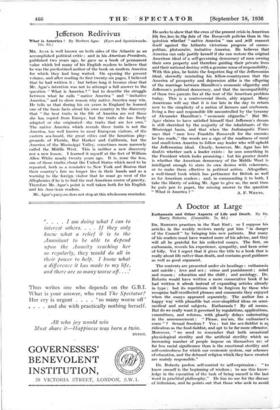Jefferson Redivivus
Ms. AGAR is well known on both sides of the Atlantic as an accomplished political critic ; and in his American Presidents, published two years ago, he gave us a book of permanent value which led many of his English readers to believe that he was the predestined author of the book on modern America for which they had long waited. On opening the present volume, and after reading its first twenty-six pages, I believed that he had written it ; but before long it became clear that Mr. Agar's intention was not to attempt a full answer to the question " What is America ? " but to describe the struggle between what he calls " native America " and " imitative America," and to show reason why native America may win. He tells us that during his six -years in England he learned one of the basic facts about his own country in the discovery that " the hest traits in the We of Arnerica are not those she has copied from Europe, but the traits she has freely adapted or else originated—the traits that are her own." The native America which reveals these traits is not the America, too well known to most European visitors, of the eastern sea-board, the great cities and the luxurious play- grounds of Florida, Bar Harker and California, but the America of the Mississippi Valley, sometimes more narrowly called the Middle West. This is neither a new discovery nor a new lesson. I learned it myself at the feet of William Allen White nearly twenty years ago. It is, none the less, one of those truths about the United States which need to be repeated, both as a reminder to New York and Boston that their country's fate no longer lies in -their hands and as a warning to the foreign visitor that he must go west of the Alleghenies if he is to find the real American centre of gravity. Therefore Mr. Agar's point is well taken both for his English and his American readers:
Mr. Agar's purpose does not stop at this wholesome reminder. He seeks to show that the crux of the present crisis in American
lift lies, less: (ate of the Roosevelt policies than in the question Whethef " native America " can and will reassert itself against the hitherto victorious progress of cosmo- politan; plutoeratic, imitative America. He believes that America can only justify herself if she can restore the original American ideal of a self-governing democracy of men owning their own property and therefore guiding their private lives and their national destiny with a genuine sense of responsibility. With this plea, he hoists the forgotten flag of the Jefferson* ideal, shrewdly reminding his fellow-countrymen that the America of prosperity and depression alike is the offspring of the marriage between Hamilton's economic oligarchy and Jefferson's political democracy, and that the incompatibility of these two parents lies at the root of the'American problein today. This is a controversial thesis, ably argued. Many Americans will say that it is ;too late in the day to return now to the simplicity of a nation of farmers and craftsmen, living a free and responsible life uncontrolled by the tyranny of Alexander Hamilton's " economic oligarchs." But Mr. Agar claims to have satisfied himself that Jefferson's dream is still cherished by the majority of the inhabitants of the Mississippi basin, and that when the Indianapolis Times says that " men love Franklin Roosevelt for the enemies he has made," the words are a sign of the readiness of rural and small-town America to follow any leader who will uphold the Jeffersonian ideal. Clearly, however, Mr. Agar has his doubts whether such a leader exists : he sees something in the President which looks promising : but his greater doubt is whether the American democracy of the Middle West is intelligent enough to state its own desires with coherence, or to make them effective in political action. Altogether, a well-timed book which has pertinence for British as well as for American readers ; and, in commending it to both, I take the liberty of asking Mr. Agar to give us, the next time he puts pen to paper, the missing answer to .the. question










































 Previous page
Previous page